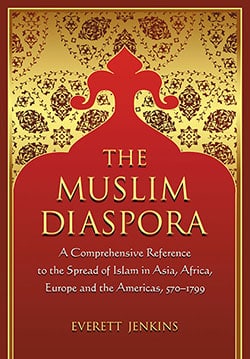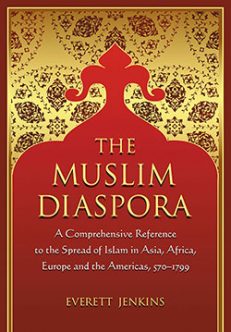The Muslim Diaspora (Volume 1, 570–1500)
A Comprehensive Chronology of the Spread of Islam in Asia, Africa, Europe and the Americas
$75.00
In stock
About the Book
This first volume covers the development of Islam in the period from the birth of Muhammad in C.E. 570 through 1500, during which Islam grew to dominate the area which has come to be known as the Middle East.
Along with their religion, Muslims carried their culture, their goods, and their innovations to the far corners of the globe. Their contributions to Western civilization-such as new kinds of agriculture (irrigation, oranges, sugarcane, cotton), manufactured goods (satin, rugs, paper, perfumes), and technology (astrolabe, compass, lateen sail)—are set out in detail.
About the Author(s)
Bibliographic Details
Everett Jenkins, Jr.
Format: softcover (7 x 10)
Pages: 440
Bibliographic Info: chronology, tables, appendices, bibliography, index
Copyright Date: 2011 [1999]
pISBN: 978-0-7864-4713-8
eISBN: 978-1-4766-0888-4
Imprint: McFarland
Table of Contents
Acknowledgments ix
Author’s Note xi
Introduction 1
The Muslim Chronology 5
Epilogue 347
Appendices
A. The Five Pillars of Islam 349
B. Arabic Names 350
C. The Islamic Calendar 350
D. Caliphs 351
E. Muslim Religious Movements, Sects, and Schools 352
F. Shi‘a Imams 353
G. Muslim Regimes of the Middle East 353
H. Rulers of Muslim Spain 354
I. Rulers of the Ottoman Empire 355
J. Muslim India 356
Bibliography 359
Index 363
Book Reviews & Awards
“useful…recommended”—Library Journal; “detailed index”—Booklist; “Jenkins outlines this early development in precise and telling detail…lives up to its subtitle…very useful…a unique resource”—Against the Grain; “valuable historical context”—Mediaevistik.






